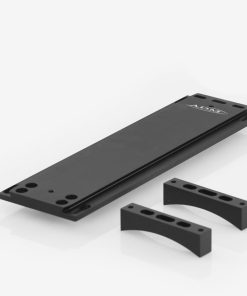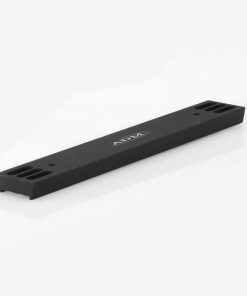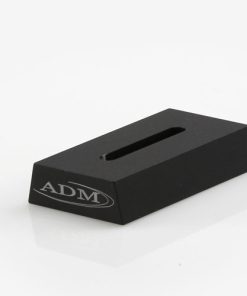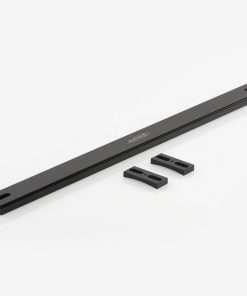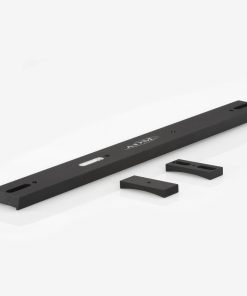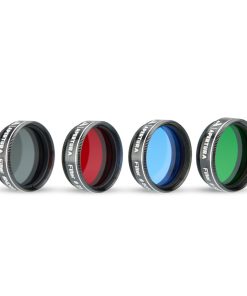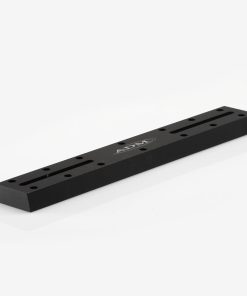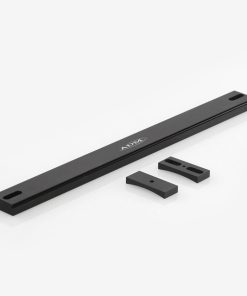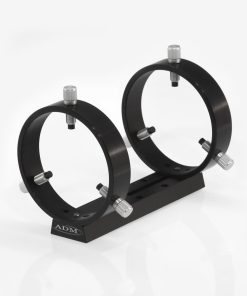AstroZap Visual Baader Solar Filter for 184 mm – 194 mm OD Telescopes – AZ1016-1 Astrozap
$ 106,80 $ 42,72
To ensure that the solar filter you buy will fit properly, please take a few moments and measure the outside diameter of your telescope, spotting scope or binoculars before you order. Remember, the solar filter needs to fit snugly around the front of the tube assembly that holds the optics. If the filter is slightly larger than its diameter, the filter can be made to fit by the addition of self-stick felt spacers to the inside of the cell. However, if the filter is too small it will not fit, and that would be a shame. So please, measure before you order. Thanks.
AstroZap Baader Film Solar Filter
for 184mm -194 mm Telescopes
The AstroZap solar filter is crafted using the widely praised Baader AstroSolar film for enhanced views of sunspots and solar eclipses.This solar filter is produced in Germany and has been approved for eye safety by the National Bureau of Standards.
Astrozap mounts the AstroSolar film in an aluminum cell that is sized for 184 mm – 194 mm telescopes. To install, you simply slide the filter cell over the end of your telescope and tighten the three thumbscrews so that the filter is firmly attached to your telescope. With the filter securely in place, you can look at the Sun through a standard eyepiece. Just remember not to look through your finderscope unless it has its own little filter installed! Most observers remove their finder altogether so as not to be tempted in the first place, since it is relatively easy to center the Sun in your eyepiece once you’ve learned a trick or two.
When viewed through an Astrozap solar filter, the Sun appears neutral white. Other films and some glass filters produce a blurry bluish or reddish solar image, thereby cutting out part of the spectrum. Especially with an orange sun, it is very hard to see faculae regions which are visible predominantly in the blue part of the spectrum.
Due to it’s neutral color balance, the use of an Astrozap Baader Solar Filter enables the use of various color (or interference) filters, allowing the observer to concentrate on certain spectral passbands for investigations of different layers within the solar “atmosphere”.
Eye safety
AstroSolar™ is essentially free from pinholes, since – other than with even the most expensive glass filters – it is coated on both sides, so that the chance of two pinholes overlapping each other is extremely faint. Pinholes do appear, but to 1 out of 10000 only in optical density 2.5! Baader AstroSolar™ safety film has been approved for eye safety by the National Bureau of Standards in Germany, the PTB. Unlike any other Solar Filter on the market, AstroSolar™ is CE-tested according to EG-Norm 89/686 and EN 169/92 ( notified body 0196). All processes connected to this product have been thoroughly tested. Coatings are inspected constantly for consistency to ensure your eye safety!
Sizing your solar filter
Each solar filter is designated in two ways—by the typical telescope or aperture it was designed for, and by the outside diameter range of the telescope it will fit. Before you order your solar filter, take a minute and measure the outside diameter (OD) of your telescope so that you can be sure you are ordering the right one. Each filter has 10mm of wiggle room. Three thumbscrews are provided to snug up the fit.
Once your solar filter arrives, slip it over the end of your scope and tighten the thumbscrews to make sure it fits properly. This is important, as an ill-fitting solar filter is not something you want to mess around with. If the filter does not fit, or you have any other concerns, contact our sales department and we will work with you to solve the problem. Don’t wait until that once-in-a-lifetime solar eclipse to find out your solar filter doesn’t fit!
Quick Shipping and Professional Packaging
Due to our longstanding partnership with UPS FedEx DHL as well as other major international carriers, we are able to provide various shipping options. Our warehouse personnel are well trained and will be able to pack your goods in accordance with the exact and precise specifications. Your goods are thoroughly checked and securely secured prior to shipment. Everyday we deliver hundreds of packages to our customers from all over the world. Our determination to be the biggest online retailer in the world is shown by this. The warehouses are located situated in Europe in the same way as they are in the USA.
Note: Orders containing multiple items will have a separate processing period for each item.
We will carefully examine all products before they are shipped. Today, the majority of orders will be delivered within 48 hours. The delivery time will be between 3-7 working days.
Returns
We don't manage the stock at our warehouse and factory. The actual inventory may fluctuate at any time. It's possible that you may not receive your order once it's been placed.
Our policy is for 30 days. We are unable to return or exchange your purchase after 30 days since the purchase.
In order for your item to be eligible for return the item must not be opened and in the condition you received it. It must also remain in the original packaging.
Related products
Telescope Accessories
Telescope Accessories
ADM Accessories Vixen Style Dovetail for Meade 8″ SCT – VM8 ADM
Telescope Accessories
ADM Accessories Tripod Knob Set for Losmandy G11 & Celestron CI700 Mounts – Orange – TKS-OR ADM
Telescope Accessories
ADM Accessories Vixen Style Dovetail for Celestron 9.25″ SCT – VC925 ADM
Telescope Accessories
ADM Mini Electronics Pier Knobs for Celestron CGE Pro Mount – CGE-PRO-MP ADM
Telescope Accessories
ADM V Series Dovetail Bar for Newer Celestron 6″ SCT – VC6 ADM
Telescope Accessories
ADM Accessories Rosette Tripod Knobs for Celestron Advanced VX Mount – VX-TKS ADM
Telescope Accessories
ADM Accessories Vixen Style Universal Dovetail Telescope Mounting Bar – 3″ Long – VDUP3 ADM
Telescope Accessories
ADM Accessories Tripod Knob Set for Losmandy G11 & Celestron CI700 Mounts – Black – TKS-BK ADM
Telescope Accessories
Telescope Accessories
ADM Replacement Azimuth Knobs for Celestron Advanced VX Mount – VX-AZ ADM
Telescope Accessories
ADM Accessories CGEM Knob Upgrade – Altitude Locking Knob – CGEM-T-OR ADM
Telescope Accessories
ADM Accessories CGEM Knob Upgrade – 2 Azimuth Knobs – CGEM-AZ-OR ADM
Telescope Accessories
Telescope Accessories
ADM V Series Universal Dovetail with 125 mm Rings – VDUPR-125 ADM
Telescope Accessories
Apertura 10mm 70º Super Wide Angle Eyepiece – 1.25″ – SWA10 Apertura
Telescope Accessories
ADM Accessories Celestron CGX Side-By-Side Adapter – CGX-SBS ADM
Telescope Accessories
ADM Accessories CGEM Knob Upgrade – Two Orange Anodized Rosette Saddle Knobs – CGEM-SAD-OR ADM
Telescope Accessories
ADM Accessories CGEM Knob Upgrade – Orange Tripod Knob Set – CGEM-TKS-OR ADM
Telescope Accessories
ADM Accessories Vixen Style Dovetail for Celestron C8 – VC8 ADM
Telescope Accessories
ADM Accessories Vixen Style Universal Dovetail Telescope Mounting Bar – 7″ Long – VDUP7 ADM
Telescope Accessories
ADM V Series Dovetail Bar for Celestron 8″ SCT – Extra Long – VC8-XL ADM
Telescope Accessories
Apertura 1.25″ Lunar & Planetary Filter Kit #1 – LPSET1 Apertura
Telescope Accessories
ADM Replacement Spreader Bar Knobs for Celestron Advanced VX Mount – VX-SB ADM
Telescope Accessories
ADM Accessories CGEM Knob Upgrade – Polar Hole Plug – CGEM-PL-OR ADM
Telescope Accessories
ADM Accessories Vixen Style Universal Dovetail Telescope Mounting Bar – 11″ Long – VDUP11 ADM
Telescope Accessories
ADM Accessories CGEM Knob Upgrade – Two Orange Anodized Spreader Bar Knobs – CGEM-SB-OR ADM
Telescope Accessories
ADM Mini Dovetail Bar for Celestron 9.25″ SCT – MDS-C925 ADM
Telescope Accessories
ADM Accessories Vixen Style Dovetail for Celestron 11″ SCT – VC11 ADM
Telescope Accessories
ADM Accessories Vixen Style Dovetail for Meade 10″ SCT – VM10 ADM
Telescope Accessories
ADM V Series Dovetail Bar for Celestron 8″ SCT – Orange Anodized – VC8-O ADM
Telescope Accessories
ADM V Series Universal Dovetail with 100 mm Rings – VDUPR-100 ADM



